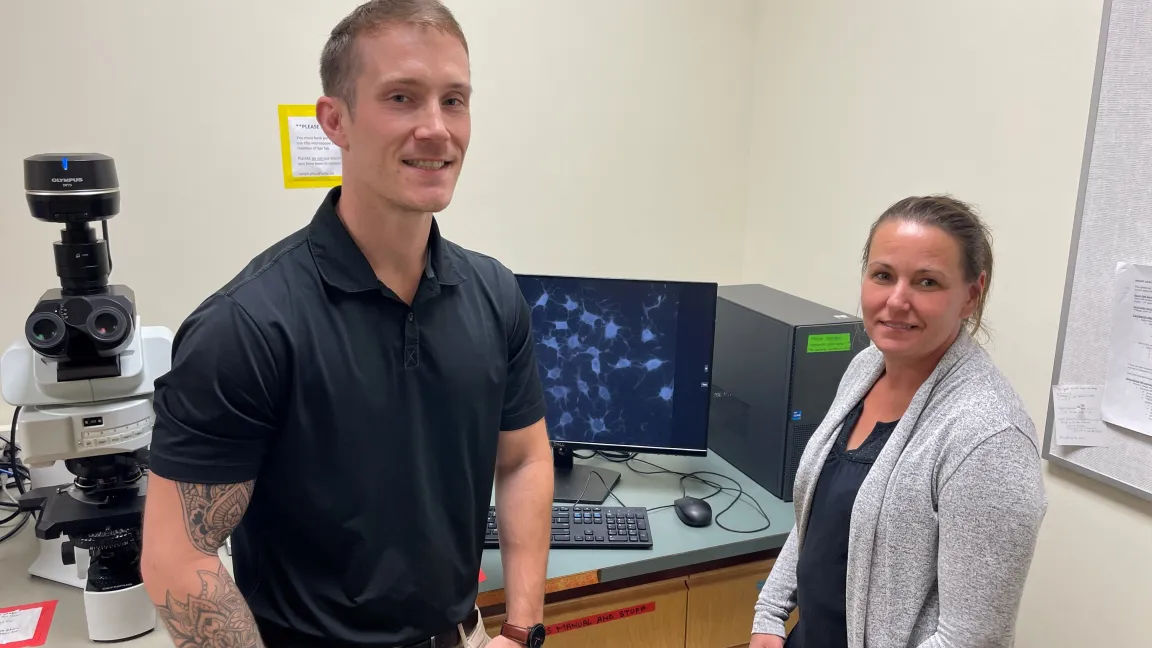Student Research: Optimizing detection of sirtuins
NMP student Brett Bernard undertook lab research over the summer to examine different ways to best detect a family of signaling proteins known as sirtuins.

With support from the UBC Faculty of Medicine Summer Student Research Program (SSRP), NMP Class of 2028 student Brett Bernard worked in the lab of Northern Medical Program Associate Professor Dr. Kendra Furber over his summer break.
Can you briefly explain your research?
The research I was doing in the lab was primarily centered around optimizing detection of proteins called sirtuins. These proteins are found in nearly every cell type in the body and have various roles in metabolism, development, apoptosis, oxidative stress as well as many others. I focused on glial cells of the central nervous system called oligodendrocytes. To detect these proteins, we used the techniques of immunohistochemistry and immunocytochemistry. This essentially meant using lab manufactured antibodies to detect sirtuins (SIRT1-SIRT7) in either tissue sections (immunohistochemistry) or lab grown oligodendrocytes (immunocytochemistry). The antibodies would bind to the sirtuin proteins then fluoresce under a microscope.
My supervisor on this project, Dr. Furber, is doing extensive research on these sirtuin proteins, particularly SIRT2 and its implication in myelination in demyelinating disorders like multiple sclerosis. Once this sirtuin detection protocol is optimized, it will be easier to determine how changes in sirtuin expression are correlated with injury such as demyelination in the central nervous system.
What inspired or prompted you to become part of this research project?
I was inspired to take part in this research project because I have a deep fascination with neuroscience. This interest actually played an integral role in my admission to medical school. The brain-body connection is an awe-inspiring and esoteric phenomenon that has always made me curious about what our reality really is.
I see the nervous system as a sort of transducer that takes external stimuli and produces reactions to it. These reactions take the form of consciousness, motor movements, reflexes, hormonal regulation, etc. I like to think of the electrochemical processes occurring in a nervous system as the core of life's expression. Albeit this is a bit of a reductionist approach, as there is much more to being. However, I don't think many would argue that the nervous system is a vital component of not just being alive but experiencing life!
Also, the work in the lab I have been doing this summer is directly related to research on neurodegenerative disease. Establishing a deeper understanding of conditions like Parkinson's, Alzheimer's and multiple sclerosis is an important matter at this time. Our population is aging, and these types of conditions are consequently expected to rise. So the research is not only interesting but purposeful.
Who did you work with on this project?
My supervisor Dr. Furber has given invaluable guidance and leadership during this SSRP and I would not have been able to conduct this research without her. NMP faculty member Dr. Andrew Giles also provided me with valuable insights into various lab techniques. Lab manager Victor Liu also helped me immensely, with hands-on training, protocol discussion and general lab orientation. The other members of the Furber lab - Nuzhia Shakkir, Nursa Shakkir, Jing Jing Ming, Adriadne Douglas, Serena Sanghera and Inderpal Parhar - also contributed to my research via hands on training and discussions about their own research. Without the help of all these individuals, I would not have conducted the same quality of experiments, for this I am extremely grateful.
How did this project help further your learning as a medical student?
This research contributed extensively to my education as a medical student. I have a new appreciation for the work, tedium and commitment required to conduct research. In medical school, there is generally a broader theme of education. We have weeks dedicated to specific topics like stroke or pregnancy. This research is more narrowed, as it focuses on specifics. I've spent a significant proportion of this SSRP educating myself on oligodendrocytes, their stages of development and when we'd expect to see expression of sirtuin proteins.
Although this approach of thinking about one thing for a long time is different from the broad sweep of medical school, it requires disciplined focus in a similar fashion. Also, much of clinical practice is learning protocols (e.g. the cranial nerve exam), lab work is no different. If there is one thing this experience has taught me, it is that practice equals improvement. Doing the same experiment over and over will make you proficient at conducting it. The same is true for clinical skills (like the kind examined in an Objective Structured Clinical Examination [OSCE]). Additionally, after working in the Furber lab for the summer I have become much faster and calculating concentrations. This will no doubt come in handy when I am titrating medication dosages.
Anything else you would like to add?
If you are interested in research, it is important to do it about something you are genuinely interested in. It can be monotonous and doesn't always produce the results you want to see. The key is, in my opinion, to have an insatiable curiosity about the topic you are interested in. This makes the work less draining and increases resilience to a lack of results. True research takes a lot of time and effort. So, it is in your best interest to be interested in what you are researching.